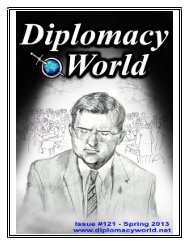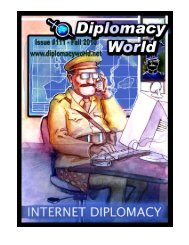Diplomacy World #103 - Fall 2008 Issue
Diplomacy World #103 - Fall 2008 Issue
Diplomacy World #103 - Fall 2008 Issue
You also want an ePaper? Increase the reach of your titles
YUMPU automatically turns print PDFs into web optimized ePapers that Google loves.
not put his orders in the box. This was noticed after<br />
orders had been substantially read. Chris Martin<br />
challenged whether the orders should be read and he<br />
suggested that the player may have two sets of orders.<br />
One of the tournament directors allowed the orders to be<br />
read, which clearly was the wish of all the other players,<br />
except Chris Martin. I was watching the game, and used<br />
this as an example in discussions in a newsgroup and<br />
elsewhere later. (I wasn’t second guessing the call.) At<br />
Bangor Dipcon 41 a player did not put his orders into the<br />
box and there was some question about where original<br />
orders maybe. Tom ruled against allowing the player’s<br />
orders. I didn’t see the situation, but I know that all of<br />
the players were okay with the decision. The player was<br />
my son, Peyton.<br />
I made two calls related to orders. The first involved my<br />
son Peyton again. The structure of the orders was<br />
intended to be:<br />
A moves to C; B supports A to C<br />
The problem was that he omitted an S for supports,<br />
definitely a problem. This occurred in the first round<br />
minutes after I had given the criteria that informed<br />
players that I would allow such an order. I was called to<br />
the table; I didn’t see the board. I could see that people<br />
with one exception were inclined to let it go. One player<br />
seemed inclined to let it go, but wanted me to rule<br />
because it involved my son and presented an<br />
opportunity to paint the tournament as biased. Also, he<br />
was technically correct. My son looked embarrassed.<br />
My first inclination was to say too bad Peyton because<br />
he was my son; however, I immediately realized that he<br />
was probably allied with someone and the ruling would<br />
impact other players, positively and negatively. One of<br />
the players said, what do you think his intention was?<br />
Instantly, I read off what was the obvious intention of a<br />
sloppy order writer, not one player complained.<br />
In the other case, a player had a structure that was<br />
essentially two adjacent units attacking an unsupported<br />
unit of another player. However, the fundamental<br />
difference was that one of his units eligible to supply<br />
support could be cut by another defending unit. I had to<br />
rule against the order. The person who wrote the order<br />
wasn’t upset because he had to look at the board<br />
several times to determine what he had been thinking!<br />
Jim Burgess and Chris Campbell were present for both<br />
of my rulings. Later, it would be alleged that I ruled<br />
inconsistently in my favor. Bull. Chris Campbell was the<br />
defender in the second case and avoided losing Warsaw<br />
as Russia in the <strong>Fall</strong> of 1901, and he wanted me to rule<br />
against upholding the order! Jim Burgess was his ally in<br />
Turkey. I was playing in the second game, discovered<br />
the problem in the order, and ruled against my ally. The<br />
decision didn’t impact the outcome of the game. 6<br />
6 Steve Cooley later, in a conference call 7/30/08, had portrayed the<br />
positions as being exactly the same (the sound quality was miserable<br />
<strong>Diplomacy</strong> <strong>World</strong> <strong>#103</strong> - Page 48<br />
Seeding the Rounds: Generally speaking a simplistic<br />
Windows program that I wrote in a low end programming<br />
language called Liberty Basic was used. On a fast<br />
computer and with the largest known <strong>Diplomacy</strong><br />
tournaments requiring very little data crunching, the<br />
program executes everything instantaneously. In<br />
Vancouver, a few people suggested that I use Manus<br />
Hand’s DTM software;<br />
On 8/19/2007, I wrote to Manus this email:<br />
“Hello Manus,<br />
At WDC 17, several people suggested that I obtain a<br />
copy of DTM. Please send me a copy at<br />
websterdtpl@gmail.com. Also, Dipcon 41 will be held in<br />
Bangor, Maine. I would be happy to help you with<br />
accommodations. Thank you, David Webster”<br />
September 9, <strong>2008</strong>, (after Bangor Dipcon 41) Manus<br />
responded,<br />
“My horrible apologies for taking so long to get to this! I<br />
have been ignoring this email address for a very long<br />
time (bad Manus!). I now have 3500+ mails to go<br />
through. You can download the DTM at<br />
http://www.diplom.org/armada/dtm/DTM[3.12.19].zip<br />
My profuse apologies. Manus”<br />
Immediately after Vancouver I pursued a copy of the<br />
NADF approved seeding software. I never received it. In<br />
the aftermath of Bangor Dipcon 41 and being labeled a<br />
cheat, I mentioned that I had attempted to use the<br />
NADF’s software, even though I had my own. Soon<br />
thereafter, I received the email from Manus. For the<br />
record, you must get the link from Manus by asking him<br />
through email, this is explicitly stated as a requirement.<br />
I’m not blaming Manus. It is ironic that one justification<br />
for stripping Bangor was slow response times to Edi<br />
Birsan’s requests. Please note the NADF software<br />
linked site was 3500+ mails behind. Likewise, you may<br />
or may not recall that the NADF home website was not<br />
updated from September 2007 until May 30, <strong>2008</strong>.<br />
The computer software that seeded the boards was<br />
supposed to be used by Dennis Hutchins. Someone<br />
needs to input the players for the tournament, and then<br />
select those who are actually playing in a round. In most<br />
cases, the software prevents family members from<br />
playing on the same board. No family member played on<br />
on the call.) So bad, that I am not positive what precisely Steve had<br />
said. I contested any representation about the orders being equivalent<br />
situations. Steve was present at the first ruling, and over a hundred<br />
yards away in the television studio being filmed when the second<br />
decision was made. He flatly does not have a basis to be talking<br />
about this issue. I was not allowed time to make this point in the<br />
conference call.




